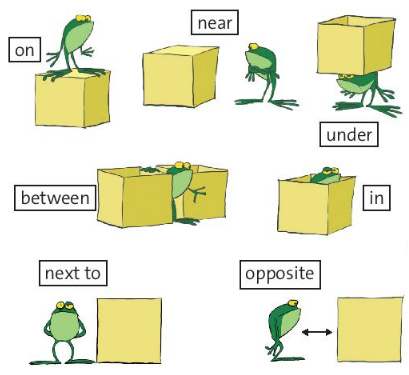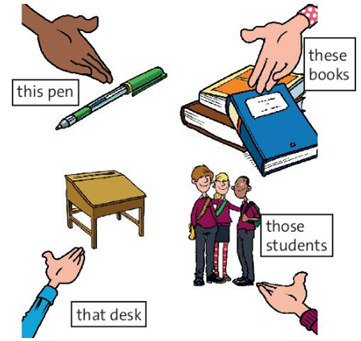1. be: affirmative and negative
(Động từ “be”: khẳng định và phủ định)
|
Affirmative (khẳng định) |
|
|
I’m You’re He‘s/ She’s/ It’s We’re/ You’re/ They‘re |
from Oxford. twelve. into video games. |
|
Negative (phủ định) |
|
|
I’m not You aren’t He/ She/ It isn’t You/ We/ They aren’t |
interested in shopping. very good. into sport. |
2. Subject pronouns and possessive adjectives
(Đại từ đóng vai trò chủ ngữ và tính từ sở hữu)
|
Singular (số ít) |
Plural (số nhiều) |
||
|
Subject pronoun (Đại từ chủ ngữ) |
Posessive adjective (Tính từ sở hữu) |
Subject pronoun (Đại từ chủ ngữ) |
Posessive adjective (Tính từ sở hữu) |
|
I (tôi) |
my (của tôi) |
we (chúng tôi) |
our (của chúng tôi) |
|
you (bạn) |
your (của bạn) |
you (các bạn) |
your (của các bạn) |
|
he (anh ấy) she (cô ấy) it (nó) |
his (của anh ấy) her (của cô ấy) its (của nó) |
they (họ) |
their (của họ) |
3. Object pronouns
(Đại từ đóng vai trò tân ngữ)
|
Singular (số ít) |
Plural (số nhiều) |
||
|
Subject pronoun (Đại từ chủ ngữ) |
Object pronoun (Đại từ tân ngữ) |
Subject pronoun (Đại từ chủ ngữ) |
Object pronoun (Đại từ tân ngữ) |
|
I (tôi) |
me |
we (chúng tôi) |
us |
|
you (bạn) |
you |
you (các bạn) |
you |
|
he (anh ấy) she (cô ấy) it (nó) |
him her it |
they (họ) |
them |
4. Prepositions of place
(Giới từ chỉ vị trí)

- on: trên
- near: gần
- under: bên dưới
- in: trong
- between…and…: giữa…và…
- next to: bên cạnh
- opposite: đối diện
5. Possessive ‘s
(Sở hữu cách ‘s)
|
RULES (Quy tắc) |
|
1. We use ‘s for possessive with singular words. (Chúng ta sử dụng hình thức sở hữu ‘s với các từ số ít.) 2. We use s’ for possessive with plural words. (Chúng ta sử dụng hình thức sở hữu s’ với các từ số nhiều.) |
6. be: questions
(Động từ “be”: dạng nghi vấn)
|
Questions (câu hỏi) |
Short answers (câu trả lời ngắn) |
|
|
Am I |
in class? (ở lớp?) at home? (ở nhà?) |
Yes, I am. / No, (3) I’m not. |
|
(1) Is he/ she/ it |
Yes, it (4) is. / No, it isn’t. |
|
|
(2) Are you/ we/ they |
Yes, they are. / No, they (5) aren’t. |
|
7. Possessive pronouns
(Đại từ sở hữu)
|
Posessive adjective (Tính từ sở hữu) |
Posessive pronoun (Đại từ sở hữu) |
|
my (của tôi) |
mine |
|
his (của anh ấy) |
his |
|
her (của cô ấy) |
hers |
|
our (của chúng tôi) |
ours |
|
your (của bạn) |
yours |
|
their (của họ) |
theirs |
8. this, that, these, those
(cái này, cái kia, những cái này, những cái kia)

- This/That is used for singular nouns.
(This/That được dùng với danh từ số ít.)
- These/Those is used for plural nouns.
(These/Those được dùng với danh từ số nhiều.)
9. have got (có)
|
Affirmative (Khẳng định) |
||||
|
I/ You/ We/ They He/ She/ It |
‘ve ‘s |
got |
a mobile. a pet. |
|
|
Negative (Phủ định) |
||||
|
I/ You/ We/ They He/ She/ It |
haven’t hasn’t |
got |
a mobile. a pet. |
|
|
Questions (Câu hỏi) |
||||
|
Have Has |
I/ we/ you/ they he/ she/ it |
got |
a mobile? a pet? |
|
|
Short answers (Câu trả lời ngắn) |
||||
|
Yes, I/ we/ you/ they have. Yes, he/ she/ it has. |
No, I/ we/ you/ they haven’t. No, he/ she/ it hasn’t. |
|||
10. Question words: Where…?, What…?, Who…?
(Từ để hỏi: Ở đâu…?, Cái gì…?, Ai…?)
- where: ở đâu => hỏi về nơi chốn/ địa điểm
Ex: Where's Neymar Junior from?
(Neymar Junior từ đâu đến?)
- what: cái gì => hỏi về sự vật/ sự việc
Ex: What's a taco?
(Taco là gì?)
- who: ai => hỏi về người
Ex: Who's Usain Bolt?
(Usain Bolt là ai?)
11. Conjunctions: and, or, but
(Liên từ: và, hoặc, nhưng)
- or: hoặc
Ex: Is her name Beth or Bess?
(Cô ấy tên Beth hay Bess?)
- and: và
Ex: I speak English and Japanese.
(Tôi nói tiếng Anh và tiếng Nhật.)
- but: nhưng
Ex: I've got a laptop, but I haven't got any speakers.
(Tôi có máy tính cá nhân, nhưng tôi không có loa.)
soanvan.me
